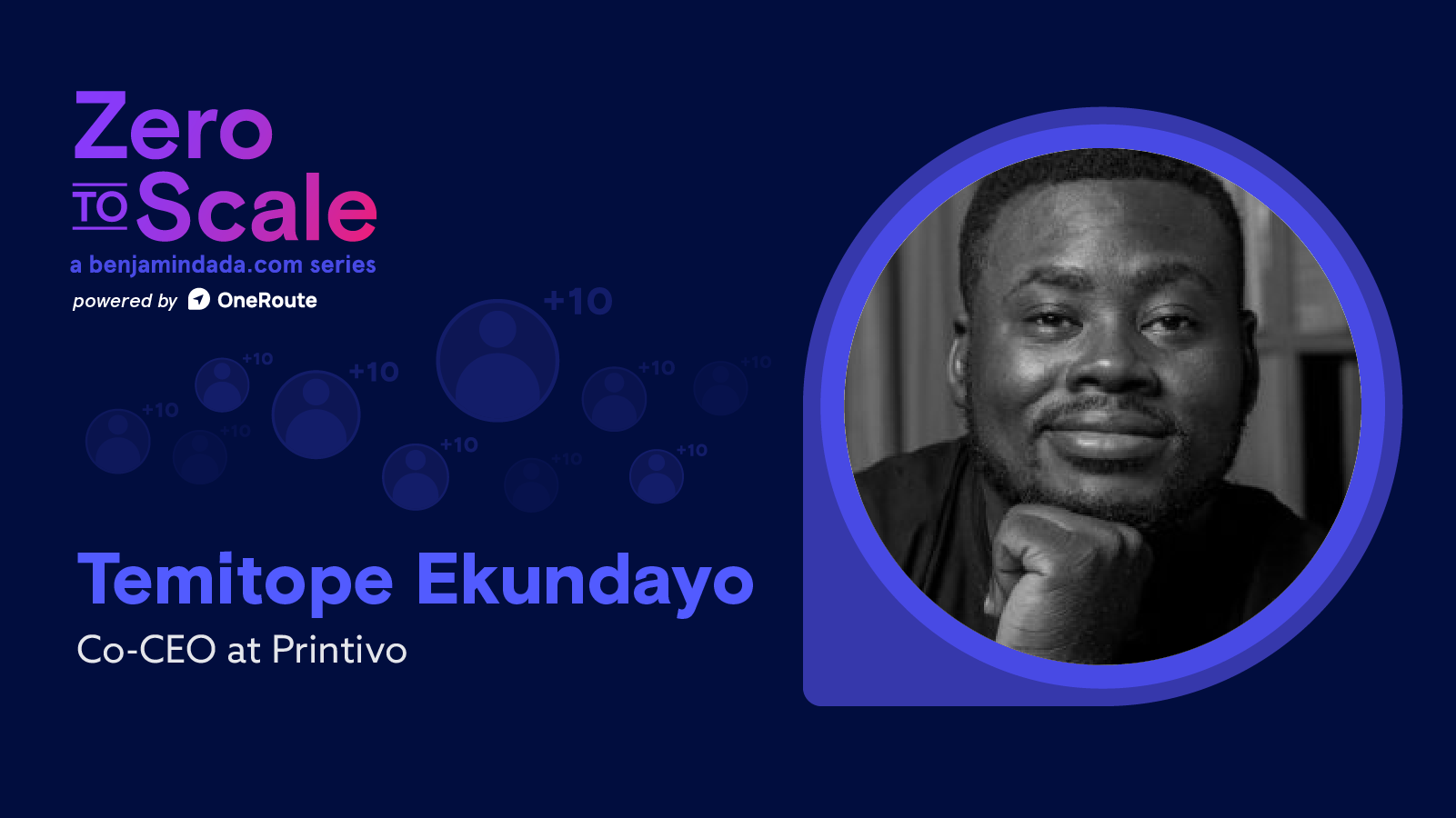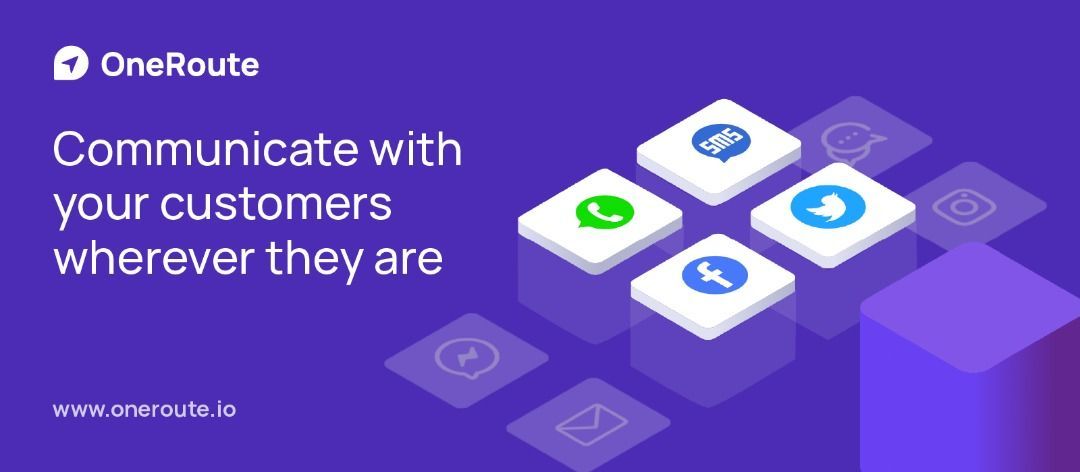Zero To Scale: Temitope Ekundayo, Co-CEO at Printivo
In this third edition of Zero To Scale, Temitope Ekundayo talks to us about how impressive customer service and one amazing referral started the scaling journey for Printivo.

Zero To Scale is a new web series that focuses on the journeys of African founders and their startups from day zero until the day they achieve scale. Zero To Scale is produced in partnership with Oneroute.io, an all-in-one tool for your customer communication needs.
Temitope Ekundayo is the co-CEO at Printivo. Prior to his time as Co-Ceo, he was Head of Growth at the company. In this third chapter of Zero To Scale, he talks to us about how impressive customer service and one amazing referral started the scaling journey for Printivo.
How long have you been at Printivo, were you part of the founding team?
I joined just a few months after we began operations. You can almost say that I was part of it from day 1.
Printivo plays in a unique space in that it is not a conventional tech company. Can you tell us a bit more about how you see yourselves?
I’ll put it this way—we’re a technological company, but we found ourselves providing solutions for the creative industry. At the end of the day, for creatives, everything can be digitalised design-wise, but the missing link when creating products is working with printers who have old ways of thinking and operating. So, we have brought technology to a typically traditional industry.
For clarity, this old operation is quite contextual to this continent. In other markets, there are more advanced processes and technologies. We’re still playing catch-up in Africa, but we’re using technology to bridge the gap.
At the time we came into the industry, social media was awash with people tired of their printers, calling the police, and all sorts because the general quality of prints was bad. People would typically have to print abroad to get decent quality.
The idea for the company comes from our own pain point. The founding team was running a creative agency, and printing is one pain point that came around when we dealt with clients who had events and needed print. It was a pain-point from our own use case, where we had to start up a company to disrupt the printing industry in Nigeria. In the journey of learning, we had to become printers.
We had no idea of how to run a printing company or printing in general, but we jumped into the fray and became better printers than the original printers themselves and layered advanced technology on that.
What were some of the early challenges you faced at Printivo?
One of the first things we faced was the learning curve. The printing world is so large that 10 years after, I am still learning new things. At first, we needed to learn foundational stuff really fast—what differentiates quality print from bad print. Then, we had to figure out how to create the experience online.
At a high level, Printivo has 3 layers—there’s a full-size manufacturing outfit, a technology e-commerce operation, and the logistics. It’s literally building 3 companies in one. I could probably break it down into 15 companies if we take a top-down approach.
Having to figure out all these parts working hand-in-hand and then ensuring that our service delivery gets to customers between 5 - 7 days was a hell of a ride.
Printivo is not a traditional tech company, which means you couldn’t just throw ads at people. How did you scale the business?
We came into the market at a time when the pain of bad print was at an all-time high, so it was a perfect time for us. However, as an online-focused business, we were very versatile with digital tools. It was a time when digital marketing was just becoming a thing. Twitter was getting a lot of influx at the time and we decided to focus on it.
The big break came when a non-Nigerian journalist came into the country and needed to print something for a meeting. We took on the project and turned around her cards in a few hours. She tweeted about it, and that was how it caught on.
From then on, referrals kept coming in. That’s how we have kept growing. I’d say it’s because we focus 300% of our resources on an amazing customer experience. So, they enjoy it and come back to patronize us.
Partner message

Incredible. Sounds like great customer service is part of your core offering. Can you tell us a bit more about how Printivo thinks about customer service?
Yes. Customer service is important to us. For us, it’s about improving the delight of our customers and improving their experience when they order. We have an agreement that says 3 - 5 working days in Lagos, and within 7 working days outside Lagos. We always ensure that we keep to the agreement and will move mountains to get it done.
The customer experience starts before the order comes in, and continues well after they’ve made their purchase. Whenever we go wrong, we ensure that we make up for it. The goal is to get customers to have such a good experience that makes them come back. In our kind of business, we’re often required to do crazy things because people often remember us at the last minute and they still need to get it delivered.
One of the cases that come to mind was a client in London. She was getting married the next day and insisted on using our service. Since there was an emotional connection about her getting married, we were determined to do it. We tried everything, called everyone we knew, asked people travelling to help with the delivery, etc. Eventually, when we got someone who was willing to help deliver, we only had a small window of delivery. We had to run to the tarmac very early in the morning to ensure that the package got there. She’s still a customer today.
After the big referral by the Journalist, how did you handle the inflow of orders, especially as regards logistics?
From day one we quickly figured out that we needed logistics on the ground. That was 2013-14 and there weren’t as many logistics companies as you have today. So, we had to create our own in-house logistics system. That included getting our own bikes and letting them deliver to all locations within Lagos. Then we had to figure out of state deliveries and inter-state deliveries.
Our internal logistics system was ahead of its time. That was around the time Google maps was just coming into the country and the few logistics companies that were around then didn’t know how to use it. We also had a route-mapping system we used. Even when we tried to explain it to them, they didn’t understand. So, we decided to run it ourselves. We still run the internal logistics team.
What were the most important lessons you learnt from watching Printivo grow?
Interesting. One of the important things I learned is that “moving fast” is not a joke. It’s actually important because you need to move fast if you have an end goal in mind. If you set up a meeting and there’s an agreement, the implementation should start within the hour. People need to take a lot of responsibility because the company can die if you don’t put in that effort.
I know there’s a school of thought that says you’re here to work a 9 to 5 and go home, but it is those extra hours you put in that let the company grow. At the early stage, you’re likely to be wearing multiple hats and you may not have the luxury of time to keep stuff for later. So, you have to be quick to execute.
The next thing for me is understanding the kind of teammates you have. As a person, I don’t like meetings. So, once we figure out an idea, I want to go straight to execution. If we have a general idea and we’ve decided on the strategy, I don’t see a reason to meet for clarification. We can communicate but if the general direction hasn’t changed, there’s no need to have endless meetings.
In those early days, there’s not really a lot of time. It comes with a lot of stress, but that’s part of the package of working at a startup.
Another thing I learnt from working with an execution-led team is to stay true to what you are. At every point in time, people will have ideas of what you can be. There will always be tangential iterations of what you can be. But the fact is that you have one idea that made you start the business. Unless of course, if it’s a much bigger opportunity than what you’re working on. But if your initial idea has a lot of potential, you have to be dogged about it.







Comments ()